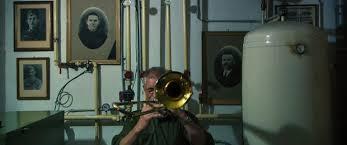Dir: Ulrich Seidl. Austria. 2014. 85mins

Austrian director Ulrich Seidl is a master of cruel realism, a dispassionate observer of the more squalid side of human nature. The title of his latest – a return to the documentary form of his earliest films – suggests yet another journey to the depths, especially in view of the notoriety that certain Austrian basements have achieved in recent years. But although some scenes, especially those involving an S&M ‘love slave’ and his dominatrix partner, are difficult to watch without flinching, In the Basement turns out to be a film of wry fascination, a compellingly weird journey into a domestic space where repressed desires are acted out and where social and political taboos are given free rein.
We knew from his fictional work that this is a director who edits reality to fit his worldview; here, at least, the material feels fresher, more honest, even at times more compassionate, than it did in the Paradise trilogy, where the actors are like insects pinned to the wall, wriggling while he films them.
Marred only by certain mannerist tics, In The Basement (Im Keller) is a film that could achieve at least the same arthouse distribution as Seidl’s recent ‘Paradise’ trilogy – as long as it’s targeted at audiences with sensitive irony meters and strong stomachs.
The film is an assemblage of brief vignettes and longer, fleshed-out scenes featuring recurrent characters. In both cases Seidl often resorts to a device both he and his late lamented compatriot and fellow depth-plumbing director Michael Glawogger have used more than once: the static shot of standing or seated human subjects, staring calmly or sullenly at the camera, held just too long for comfort. There’s a heavy-featured woman in the laundry room, a corpulent hunter and his wife sitting on a sofa under their trophy wall, teenage kids in their underground party space (the latter providing a rare breath of normality, though the suggestion is perhaps that in a few years time they’ll be as messed-up as their elders).
Less of these clichéd static shots would have been more; it’s in more conventional observation and confessions to camera that the film really delivers its strange, melancholic universe, revealing that what people get up to in the privacy of their own basements is, in Seidl’s view at least, part of a sad human comedy.
There’s a wannabe opera singer who now runs an underground shooting range, where friends come to shoot a few rounds and relax into the kind of casual racist badinage that is frowned on up there on the surface. There’s a woman who keeps creepily realistic Reborn babies in boxes in her cellar space and takes them out to coo over (the first time we see one emerge from its packing, we’re queasily unsure for a few horrifying seconds whether it’s replica or real).
There’s the aforementioned hunter, who spends his holidays shooting game in Africa and chuckles about the time he once served a safari guide Wiener Schnitzel made from warthog meat. There’s a corpulent hooker who “used to be in sales”, and her shoulderless S&M client, a pint-sized superfly in a latex jockstrap. There’s a trussed-up middle-aged female masochist you wouldn’t give another glance at if you met here in a supermarket, who talks calmly about how she likes having her nipples pierced and wearing needle corsets, before revealing that she works for the Catholic charity Caritas helping victims of domestic abuse.
Two sets of characters stand out, and are given more screen time: a brass-band musician of ramrod military bearing whose cellar contains a roomful of tacky Nazi memorabilia, including a Hitler portrait. “This is the cosy room where I spend most of my time”, he informs us; but his underground drinking sessions with other band members are shadowed by the presence of a never-seen wife who communicates with him from the floor above by calling him on his mobile (he leaves trays of food for her on the stairs). Then there are the S&M stars of the show – a dominatrix wife and her tubby security-guard husband, who she calls ‘pig’ and puts through several demeaning tasks, including licking the toilet bowl clean and doing the washing up with metal weights dangling from his genitals.
How on earth did these people allow themselves to be filmed? we ask as we watch ‘pig’ being hoisted off the bed in a particularly painful fashion. We will never know, but perhaps the observer-observed dynamic was less straightforward than the ‘documentary’ tag leads us to believe. The pressbook reveals that the surrogate mother has just one Reborn doll that she doesn’t keep in her basement; Seidl ran with the suggestion and scripted a story for her. But we knew from his fictional work that this is a director who edits reality to fit his worldview; here, at least, the material feels fresher, more honest, even at times more compassionate, than it did in the Paradise trilogy, where the actors are like insects pinned to the wall, wriggling while he films them.
Production company: Ulrich Seidl Film Produktion
International sales: Coproduction Office, www.coproductionoffice.eu
Producer: Ulrich Seidl
Idea and concept: Ulrich Seidl, Veronika Franz
Cinematography: Martin Gschlacht
Editor: Christoph Brunner




















